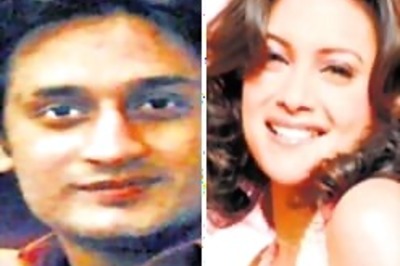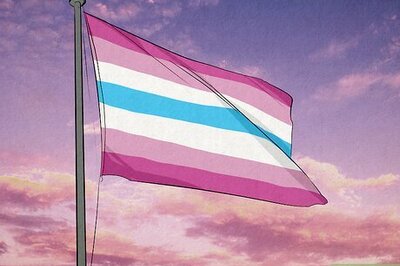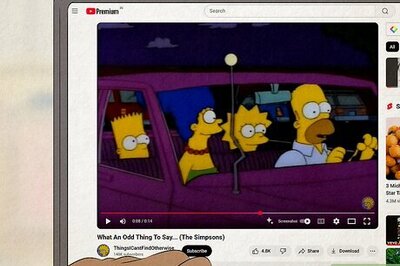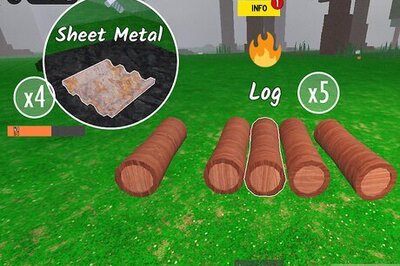
views
Caracas: Venezuelan President Hugo Chavez has returned to Cuba to begin chemotherapy nearly a month after surgery to remove a tumor, and he is expressing optimism the treatment will help him survive his cancer.
Chavez said he would start the treatment in Havana on Sunday in an attempt to ensure cancer cells do not reappear following last month's operation.
"We're going to give it everything we've got," Chavez said in a televised speech shortly before he left Caracas on Saturday. He said there is always a risk cancer cells might show up again, "and therefore there's a need to attack hard through chemotherapy."
Chavez was accompanied by one of his daughters, Rosa, who held his hand as they boarded the presidential jet.
"It's not time to die. It's time to live," Chavez said. "I'm saying goodbye for some days, but in a deeper sense I'm not saying goodbye. ... I'll be attentive every day, every hour, every minute to internal events and I'll be in permanent contact."
Chavez was met at the airport in Havana by Cuban President Raul Castro.
The 56-year-old Chavez made contingencies for his absence by delegating some of his duties to Vice President Elias Jaua and Planning and Finance Minister Jorge Giordani.
Chavez, who has held dominant power during more than 12 years in office, has refused opposition demands that he temporarily cede all his powers to Jaua while undergoing chemotherapy, but he said at a televised Cabinet meeting that he would hand off some administrative responsibilities. Chavez said his decision to entrust some of duties to aides was a result of "deep reflection" while coping with his illness.
He said the vice president would oversee budget transfers to government ministries, presidential commissions, any approved expropriations of businesses and other budget-related responsibilities. Giordani is to deal with matters including budget shortfalls and certain tax exemptions.
Chavez denied he was in any way ceding his functions as president.
He said that if his physical capacities were diminished in the future, "I would be the first in doing what the constitution says" in delegating his position to the vice president.
In a speech to party leaders and aides Saturday afternoon, he called for them to defeat any internal divisions, describing such conflicts as "cancerous tumors within the political body."
"Unity, unity, unity," Chavez said.
He repeated that message later as he addressed troops and supporters on the steps of the presidential palace. He announced new appointments for five generals, including the chief of his presidential guard, saying the moves were to "continue strengthening the unity of the Armed Force."
"Military unity, civilian unity. ... National unity. That's one of the greatest ways you can help me now," Chavez said. "I will return, and I'll return better than I'm going away."
Chavez spent much of June in Cuba undergoing surgeries to remove an abscess and the tumor. He made a surprise return from Cuba to Venezuela on July 4 and during nearly two weeks at home rallied supporters, addressed troops and generally sought to reassure Venezuelans that he is in control in spite of his illness.
Chavez said his June 20 surgery in Cuba removed a cancerous tumor the size of a baseball. He hasn't said what type of cancer he was diagnosed with nor specified where exactly it was located, saying only that it was in his pelvic region.
Chavez acknowledged on Wednesday for the first time that he expected to undergo chemotherapy or radiation treatment.
The National Assembly had to vote on Saturday to approve Chavez's trip to Cuba, and the issue raised a passionate debate in which opposition lawmakers said they supported the president's right to receive treatment but disputed his plan to remain in charge while in Havana.
Opposition politicians said they believed Chavez's request constituted a "temporary absence" and that the president owed the country a more detailed explanation of how serious his illness is.
"Let him go to Cuba," opposition lawmaker Alfonso Marquina said during the debate. "But we also demand compliance with the constitution ... so that he doesn't continue governing from Havana."
Under Venezuela's constitution, the vice president may take the president's place during temporary absences of up to 90 days, which the National Assembly may extend for 90 days more, for a total of about six months.
Pro-Chavez lawmaker Cilia Flores said the National Assembly was simply granting Chavez permission to be away for more than five days and that he would remain in charge.
As the session was under way, Chavez appeared on television and interjected himself into the debate. He appeared on a split screen with the lawmakers' listening, dismissing his opponents' arguments as "bordering on ridiculousness."
Chavez has said he is confident he will rebound but has also acknowledged a long road to recovery remains.
The president is up for re-election in late 2012, and he told members of his party on Saturday: "We have to obtain a great victory."

















Comments
0 comment